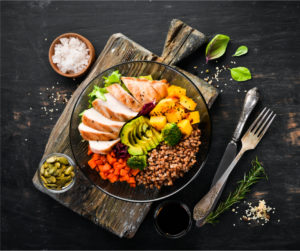Eat Up: 7 Recovery Foods to Manage Mood Swings

This article is by McCarton Ackerman and published by recovery.org
Mood swings are some of the most common symptoms experienced during the early stages of addiction recovery. These can include increased irritability, stress and anxiety. While many people seek relief via anti-stress and anti-anxiety medications, that is simply not an option for most people in recovery. Luckily, there are some simple dietary changes you can make that will help to boost your mental state and offer renewable energy. Here’s a look at some trusted recovery foods that are known to help manage stress and anxiety.
Carb-Heavy Foods
One great recovery food comes in the form of whole grains, such as whole wheat bread, pasta, baked potatoes or brown rice. Whole grains take longer for the body to break down and release sugar into the bloodstream slowly, giving you a steady stream of energy throughout the day. Even better, carb-heavy foods boost your brain’s natural production of serotonin (the feel-good chemical).
Super-Foods
Vitamin- and mineral-packed foods offer plenty of valuable nutrients that can help improve your mood throughout the day. Look for foods that contain magnesium – a mineral that helps regulate cortisol levels and promotes feelings of well-being. Good examples of magnesium foods include spinach and bananas.
B-Vitamins
A lack of B-vitamins such as folic acid and B-12 can lead to depressive or stress-filled episodes. Foods such as beans, chicken and eggs contain plenty of B-vitamins. You can also take a B-complex vitamins as a dietary supplement if you don’t care for food items rich in B-vitamins.
Omega 3-Fats
Foods rich in Omega 3-fats – officially called EPA and DHA – can greatly improve your mood. They are often found in fatty fish such as salmon, herring and canned albacore tuna, and to a lesser extent in nuts and tofu. Foods rich in Omega 3-fats – officially called EPA and DHA – can greatly improve your mood.
Folate
Folate is a type of B-vitamin naturally present in certain foods and known for its anti-anxiety effects. A Spanish study with 4,211 men and 5,459 women found that rates of depression and anxiety increased as folate intake decreased. Folate can be found in foods such as nuts, dark green vegetables, legumes and most fruits.
Oranges
Oranges are a great source of vitamin C and a proven stress-buster. Studies have shown that oranges can reduce levels of stress hormones while also boosting the immune system. Try to eat one orange per day, if possible.
Black Tea
Researchers found people who drank black tea were able to recover from stress more quickly than those who drank a different type of tea. In addition, black tea drinkers had lower levels of the stress hormone cortisol after exposure to stress or stressful situations.
Foods to Avoid
Sugary snacks and fast foods like French fries can certainly provide a quick sense of comfort, but they typically lead to energy crashes that negatively affect mood or energy levels. If you do eat these foods, be sure to use them sparingly to avoid the negative results later.